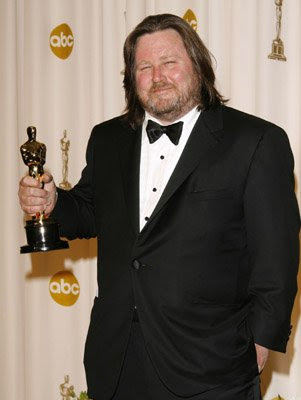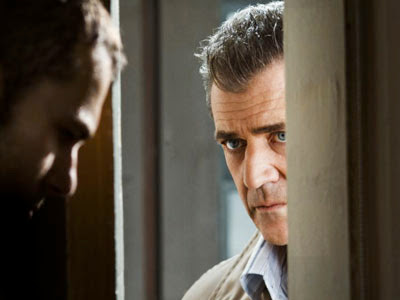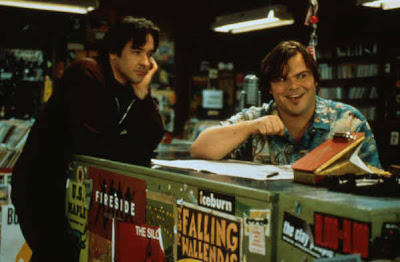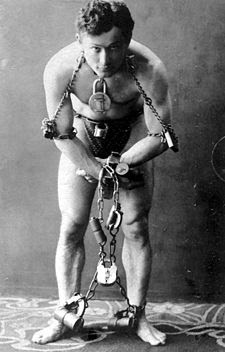Search Results for: F word
Genre: Thriller
Premise: A straight-laced but depressed cop goes on a mission to find out who killed his daughter.
About: On the eve of the announcement that Mel Gibson is reteaming with Shane Black, we get his thriller, Edge of Darkness, an adaptation of an old BBC mini-series, in theaters this Friday. This is the first project Mel’s starred in in a long time, and there were whispers it was because he was blacklisted in Hollywood after his drunken rant a few years ago. For awhile, DeNiro was actually attached to this project, but dropped out a few days into shooting because of “creative differences.” Usually, we never find out what these “creative differences” are, but in this case, we learned that it was because DeNiro didn’t memorize his lines! How cool would that have been, seeing Gibson and Deniro work together? Aww man, what could’ve been.
Writer: William Monahan
Details: 127 pages (undated)
Surprising as it may sound, I’ve never read a William Monahan script before. “Surprising” because if there’s one writer who I’m continually told other writers are in awe of, it’s Monahan. The thing is, I haven’t been impressed enough by his movies to seek out any of his scripts. Despite a few nice scenes and a couple of good performances in The Departed, I thought the story was all over the place. I know some people think I’m batty for saying so, but look at Kingdom of Heaven, which also supports the case that his stories are unfocused (and yes, I saw the extended cut as well – which turned unfocused and short into unfocused and long). Body of Lies would’ve been a bad direct-to-video title had it not been for Scott, Crowe and DiCaprio’s involvement. So I was struggling to figure out just why people were so impressed with this guy.
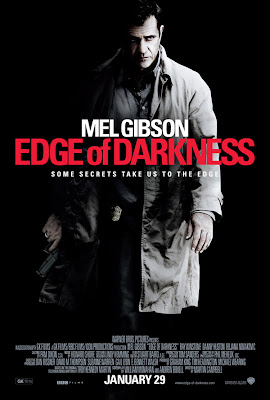
Ten pages into Edge of Darkness, I found out. I don’t know exactly how to explain it, but Monahan has a command over his words that brings even the most mundane passages alive. The thing about Edge of Darkness is it’s so relentlessly depressing that you want to give up by the end of the first act. But Monahan’s writing – the way he builds mystery, the way he builds character, the way he writes dialogue – keeps you pushing down deeper into the darkness…and enjoying it. Make no mistake, this script is about one thing – death – and never has the subject matter been so exciting.
Craven is one of those salt-of-the-earth blue collar honest Boston guys who happens to be a cop. Problem is, he’s Irish. And us Irish aren’t very good with emotions. So when his beautiful MIT-educated daughter, Emma, comes home, there are echoes of an un-nurtured relationship there, but neither of them are able to express it because of that damn Irish DNA. The irony is, this is the last chance they’ll get to break the code, to give in and emote, because there is something wrong with Emma, something very wrong.
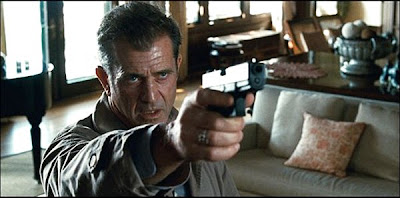
Less than a few hours after getting home, she’s vomiting worse than a coed after her first keg party. Even now, Craven can’t muster the courage to ask her what’s wrong, and it isn’t until she’s barely able to walk that the two realize, maybe we should get you to the hospital NOW. The two make it on to the front porch when a man in a ski-mask and a shot gun screams out “Craven!” and pumps a couple of shots into Craven’s daughter. She dies instantly. He runs.
Initial investigation presumes a botched attempt on Craven’s life. Happens to cops all the time. Criminals they put away come back for their own brand of justice. But there’s a problem. Craven doesn’t have any enemies. He’s one of the good ones. As Monahan writes in his dialogue, Craven could “put you away for life and you’d agree that he had a point.”
But Craven knows what these men don’t know. His daughter was the target. They did something to her. But why?
It’s no coincidence this script is titled Edge of Darkness. As far as Craven is concerned, his life is over. He just has one more thing to do before he crosses over to the other side – find out who killed his daughter, and make them pay.
The reason a non-procedural fan like myself enjoyed this procedural is because it’s not another Mel Gibson driving around kicking the shit out of a bunch of deadbeats snoozer. The mystery here, which involves Emma’s employment at a secret nuclear government facility perched atop Boston, clashes blue collar with big government, and watching a nobody cop take on an establishment that normally eats nosy guys like Craven for dinner, is, for lack of a better phrase, funner than shit.
Some of the story devices used here are as old as the medium itself, but boy do they work. These government officials are used to being able to make one phone call. “Chief, tell your guy to back off.” But Craven’s not answering to the Chief anymore. He’s gone rogue. So watching him inch his way up the company ladder, discovering the truth behind why his daughter was on the verge of dying when she came back to him that day, and outsmarting everyone in his path, is like watching dawn turn into daylight.
Now I’ll be the first to admit, what they were covering up wasn’t as cool as I wanted it to be. (Spoiler) My advice to anyone writing this kind of story. Please, for the love of God, don’t include tree-hugging environmentalists in your conspiracy. The second you involve any sort of environmentalist group into a hardcore thriller, it’s like asking the Backstreet Boys to play halftime at the Super Bowl. It weakens everything. But in the end, it doesn’t matter, because the real reason we’re here is to watch Craven get revenge, one asshole at a time. And in that respect, Edge of Darkness is a 70 yard touchdown.
Lots of things to like in this script. A risky but neat device Monahan uses is to have Craven talk to his daughter during the mission, even though she’s not there. We hear her voice, helping him along, and it’s a great little tool that both strengthens our understanding of how much he loves her, and constantly reminds us why he’s doing this.
Also, Monahan’s style reminds me of Esztheras’ in that once he hits a conversation, he doesn’t gum it up with unnecessary description. When a reader says, “It was 125 pages but it read like it was 90,” this is what they mean.
Edge of Darkness is still hard to read because of the thick stench of death around every Bah-stan corner. Everybody here is either dead, dying, wants to die, or trying to avoid death. It’s a little overwhelming at times and would probably be too much to take if the story weren’t so entertaining. I guess I should be happy that I’m still alive after reading it. And I am. It’s a tough and depressing script to get through, but worth it.
[ ] What the hell did I just read?
[ ] wasn’t for me
[xx] worth the read
[ ] impressive
[ ] genius
What I learned: Edge of Darkness combines two key storytelling devices that work extremely well. Revenge and the Underdog. We like to follow characters who fight back after they’ve been wronged (Taken, Gladiator, Kill Bill). And we love watching an underdog take on a much stronger opponent (Rocky, Braveheart, Die Hard). Combine that with a highly sympathetic character (he just lost his daughter), and you’ve got a winning formula.
Completely unrelated comment of the day: I do not have a single solitary need for the Ipad. It would not improve my life in any noticeable way whatsoever. I don’t even understand why it was made. It doesn’t do anything that other devices can’t already do. And yet, I want one. I hate my consumer side.
I am so happy to be able to share this interview with you today. Stacey Menear is the author of one of my favorite scripts of the last few months, “Mixtape,” a coming of age story about a young teenage girl who finds a mixtape that belonged to her deceased parents. When she accidentally destroys it, she uses the song list to go on a search for all the music. For those who read my review of Mixtape, you’ll remember Stacey’s script was on 2009’s Blacklist with 14 votes. But more importantly, it’s number 19 on MY LIST. This is probably my favorite interview so far because Stacey gives some great advice. Stacey is managed by Jim Wedaa and repped by Valarie Phillips and Ida Ziniti. I’ll shut up now so we can all learn something.
SS: First of all, how long have you been writing? How many scripts had you written before you wrote Mixtape?
SM: I visited my parents over the holidays and my mom reminded me that before I could actually write I would dictate stories to her about the further adventures of Indiana Jones. I don’t remember the particulars, but apparently in my version Indiana befriends a talking snake and the two of them travel the world together going on exciting archeological adventures. Sounds like a good reboot for Indian Jones, if you ask me. So I guess I’ve been making up stories as long as I remember and while I haven’t been writing screenplays all that long I’ve always written short stories and stuff like that. I’d written around 3 screenplays before Mixtape – with various starts and stops and other projects along the way.
SS: I’m sure I’m not the first one to erroneously assume that because your name was Stacey and because the script was about a 13 year old girl, that you were, in fact, female. Two questions. Do you think that assumption helped you (i.e. gave you more credit for understanding what a 13 year old girl would go through?) and what inspired a grown man to write a 13 year old female coming-of-age story?
SM: My name definitely throws people off. Though my mom denies it, my dad, who is a very manly logger living in Oregon, claims the name was a sort of “Boy Named Sue” attempt to make me grow up rough and tumble – an attempt that failed. But I’ve had more than one person tell me that my name is a benefit. I think its surprising when, instead of a 21 year old girl, this sort of nerdy looking guy with a receding hairline walks in – and if I surprise people hopefully they’ll remember me. Every little bit helps, right?
As for the inspiration…I think it came from a lot of different places. I grew up in the Northwest and I remember thinking that the Riot Grrrls were the COOLEST thing ever. I still do actually – in fact, I’m listening to Cadallaca as I write this. Unfortunately for me, I was decidedly uncool back then. I played sports, stayed at home doing homework and rarely, if ever, stuck it to the man. But I’ve always been interested in the movement/era and in girl bands in general. I also knew I wanted to do something about music – and a specific kind of music that you don’t necessarily hear on the radio. And, as you might guess, I’m a big fan of mixtapes. I still have a box full of mixtapes given to me over the years – many of them are broken, but I still have the cases and the amazing art work that someone obviously spent hours on. It was really fun over the course of Mixtape to go back and listen to some of them. They really are these frozen moments in time that capture events and emotions. One of my favorites is a break-up mixtape and on the cover is this really simple drawing of a broken heart and then the tape is just “Forever Young” playing over and over. As for why, specifically, a 13 year old girl? I just kept picturing the girl, Beverly Moody in my head; this chubby, awkward looking girl with big headphones on. I could hear her voice really clearly and it just went from there.
SS: I’ve recently received some e-mails about writers stuck in a rut, thinking their current screenplay sucks, and unable to muster up the enthusiasm to work on it. How long did it take you write Mixtape? Were there any tough times where you thought it wasn’t working? And how did you get through them?
SM: I usually work on two scripts at once – I’ll be doing the actual writing on one while doing the early outlining/brainstorming for the next one. The actual writing for Mixtape took around a month. It was really quick and easy by the time I sat down to write it. Most of my tough times on a script come in the outlining/earlier phases. My writing method includes feeling so anxious that a story won’t work that I stay up all night in bed unable to sleep and just go over the story again and again in my head. And then waking up the next day, still feeling anxious and doing a lot of pacing and mumbling and eating many bowls of cereal. How to get through the tough times is something I’m still working out. I think doing two scripts at once is one solution. It takes some of the pressure off. If you’re having trouble with one, simply go to the other one. I also don’t write scenes in order. I write the scenes that I’m excited about first. If I’m having trouble on a scene it usually means there’s a piece of the puzzle missing, so I’ll move onto something else and come back it later. For me there’s always at least one scene, character, detail that I’m excited about writing. If I focus on that one part I can keep going. It’s when I start thinking about the script as a whole – and the parts that aren’t working – that that I lose enthusiasm for the story.
SS: As everyone in filmmaking knows, music rights are expensive. Was using rare music in Mixtape purely a creative choice, or were you thinking about keeping the budget low to make the script more appealing to buyers?
SM: The musical choices were almost entirely chosen for creative reasons. I wasn’t writing this script for anyone but myself – not a studio or producer – and so I thought I might as well choose the music that I liked and that I thought the parents in the story would have actually listened to and put on this mixtape. In some cases the songs were taken from mixtapes that people made for me, like the Bikini Kill song, and in other cases they were songs that I researched. For the Blue Hearts song I knew that I needed a song in a foreign language, but it took a while to find a song that I thought worked well and fit the story. I never really thought about budget concerns during the course of writing it. I always figured that if someone was really interested in the story I could change the music to fit their tastes.
SS: The thing I like best about your script is the emotional component, which resonates very powerfully in places, yet never goes over the top. Can you tell me how you approach the emotion in your screenplays, and what the key is to not tipping over into melodrama?
SM: That’s nice of you to say. I don’t know if this is a good answer, but my approach is this: I write a scene, then I read it over and ask myself, “Is this cheesy?” And I do that over and over. I was aware that Mixtape could wander off into terra-melodrama – and so, I think just being aware of what kind of story you’re writing is one of the keys. Also, I think that when we talk about melodrama, what we’re actually talking about is monodrama. The film is hitting the same emotional beat again and again. The best films – and most emotional films in my opinion – are the ones that take you through a whole range of emotions. E.T. comes to mind. It’s scary when Elliot first meets E.T. It’s somber when they mention that dad is in Mexico (a scene I love). It’s sad, of course, when we think E.T. is dead. And then unbelievably joyful when he’s not and the boys all fly away on their bikes. And so when you get to the end and E.T. is leaving, you’ve been through all these different emotions – you’ve been up and down and all over – and, if you’re not crying at this point, then you simply don’t have a soul. If the movie was just an alien dying for an hour and a half the movie would suck, for one, but also wouldn’t resonate emotionally the way it does. And so I think if you’re going to do an emotional story you need to hit on a variety of emotions.
SS: How did it feel to land on the Black List? And did getting on the Black List open any previously closed doors for you?
SM: It felt great. Honestly, I had never heard of the Black List until about 2 months before it came out, so it was a pleasant surprise for me. And it feels pretty rad to see your name on the same list as people like Aaron Sorkin. It’s also generated some additional interest in me. There was a first wave of interest when Mixtape first began to leak out and get passed around and being on the Black List has helped keep the momentum building, as well as generate another round of meetings.
SS: I was informed in the comments section of my review that your script won the Zoetrope screenwriting competition. I feel like with you winning, the answer to this question is obvious, but do you support screenwriting competitions? Had you entered a lot of them before? Was Mixtape rejected by any notable competitions?
SM: I love them! When I finished Mixtape I really didn’t know what to do with it. I was living in Los Angeles but didn’t know anyone working in film. This always seems to surprise people, but it is, in fact, possible to live in L.A. and be completely outside the film industry. So, without any idea of how to get Mixtape in someone’s hands, I entered it into Zoetrope (and another competition that I never heard back from). My manager, Jim Wedaa, found the script through the competition and then hooked me up with my agents Valarie Phillips and Ida Ziniti. I’m very thankful to Zoetrope for helping me along – and, from my experience, would highly recommend people try it out if they think they have a good script.
SS: In one of the greatest interviews I’ve ever listened to about screenwriting, Christopher McQuarrie noted that when he wrote his Oscar-winning screenplay, “The Usual Suspects,” it was really a patchwork effort just to get through the thing, and he really had little idea what he was doing. It was only afterwards that he learned the “rules” of screenwriting, and although he doesn’t say it, he implies that he’s still never written anything as good . What are your thoughts on the rules? Do you follow a set structure when you write? Do you break the rules? Should writers follow rules at all?
SM: This is actually something I’ve thought about quite a bit and here’s what I’ve come up with: for geniuses rules are obstacles, and for the rest of us rules are helpful. I feel like rules and limitations in what I can and can’t do in a script frees me up to be creative. Having said that, I don’t necessarily use the rules I’ve read online and from books. I’ve made up a lot of my own rules as I’ve gotten better at writing. And I think that’s what it’s about – the rules should fit your story and they should fit what you do as a writer. I tend to write in four act structures and always build stories around, what I view, as three premises that could stand on their own as films. I can imagine that as McQuarrie was writing “The Usual Suspects” having little idea of what he was doing was perfect. It helped create this hugely surprising and satisfying twist in the film because not even the writer saw it coming. But I imagine that same style wouldn’t work in doing something like adapting a novel. Anyways, the point is – unless you’re a genius it’s probably a good idea to use the rules. But find the ones that work for you and your writing style.
SS: What is that one thing in a script you try to get right above all else, and what’s your process for achieving it? (ie, plot? character? dialogue?)
SM: I have a sign above my desk (I’m looking at it as I write this) that says, “Character, Dialogue, Motivation, Archetypes, The Unexpected and A Hook”. So I guess those would be the aspects that I focus on. To that list I would add simplicity. I really like simple, elegant scripts. I like scripts that let me know a clear goal, the obstacles, etc. And I like my scripts to read quickly. One of the best compliments I can get for a script is, “I read it in one sitting.” I always think of the person reading my scripts. They’ve read tons of scripts, they don’t want to read mine – so how can I keep them reading?
SS: Let’s go back to the day you decided to pursue screenwriting. When having an agent or a manger seemed a million miles away. If Present You could go back and give that young buck advice on the fastest way to breaking into the business, what would you tell him?
SM: I would pass on this article to my past self http://www.wordplayer.com/columns/wp02.Strange.Attractor.html. My first script was pretty much the most lugubrious, melancholy and hopeless script ever written by man. I would let you read it, but I’m pretty sure it would make you lose the will to live. Not only was it depressing, but it had no real hook at all, no premise. It was just this embarrassingly personal exaggerated account of living in a small logging town. And the worst part was that I worked my ass off on that script. I spent hours and hours writing it and re-writing it. So, if I could go back and to talk to my past self, I’d give him that link and tell him to work on things that at least have some small chance of ever getting made. And also, something that I strangely only learned after writing two full scripts, write the kind of movies you like watching.
SS: Care to tell us what you may be working on next?
SM: Right now I’m finishing up a spec script that will hopefully done in the near future and will be a much different – and much bigger – story than Mixtape was. I’m also sorting through open assignment and trying to find something that I can really get excited about and that I feel fits my writing style. It’s actually a really interesting place to be in – and one that I haven’t heard many people talk about. There are lots of websites and books about writing, but not much about the process of choosing projects and doing pitches etc. So I’m enjoying learning about the next stage and hopefully you’ll be hearing from me again soon.

Wanted to give a congratulations to everyone associated with Buried, the risk-taking trapped-in-a-coffin project that had a big night this weekend, becoming the first film sold at Sundance, when Lionsgate picked it up (for between 3-4 million). I always saw this as something that could light up the independent circuit, but the strong word of mouth from the festival as well as the Lionsgate pick-up means this project could have much more ambitious goals. Check out some of the reviews from Aint-It-Cool , Firstshowing, Variety, as well as Slash-Film. You can also go back and read my original review of the script back in June, as well as my interview with its writer, Chris Sparling. To this day it remains the second most downloaded script from the site (the first is Source Code) and I truly believe you guys helped build the pre-buzz that made sure a lot of eyes were on the film when it debuted this weekend. I’m telling you, this is the new way to get buzz for your film. Get your script out there. :)
Genre: Thriller
Premise: By using the ten biblical plagues, a paramilitary group plans to attack ten major cities in the U.S.
About: Sold in 1996. 850 thousand against 1.5 million. Adjusted for inflation – 1.16 million against 2 million. Rosenberg is the writer of High Fidelity and Con Air.
Writer: Scott Rosenberg
Details: 120 pages (1996 spec sale draft)

This is a funny script. I don’t know if it’s necessarily funny on purpose, but it definitely made me laugh. Why? Well, it’s just so unabashedly NINETIES. I half-expected Eddie Vedder and/or the Counting Crows to jump out and start crooning about O.J. Simpson. There’s flannel on these pages. Keanu Reeves lives in these pages. But most of all, this script embodies the overly-ambitious throw everything and the kitchen sink on the page mentality of spec scripts at the time. It was kind of like the spec world’s sub-prime mortgage. Every writer was so reckless, trying to sell their script without regard for cost or value, that when Hollywood realized they couldn’t make these movies, the spec boom imploded. I mean, I’m no producer, but in my estimation, this script had to have been budgeted at at least 250 million. BACK IN 1996!
Rosenberg himself is an interesting writer. He wrote one of my favorite movies, Beautiful Girls, which captured what it’s like coming back home as a grown-up about as well as any movie I’ve ever seen. Then over a decade later he writes the exact same movie but for TV (October Road), and it’s about the worst representation of what it’s like to come home as a grown-up (the comedic sidekick actually refuses to leave his house because he’s traumatized by 9-11, like, ever).
But Rosenberg’s written some pretty cool flicks, like the incredibly cheesy but guilty pleasure that is Con Air. And of course he wrote everybody’s favorite record store movie, High Fidelity (although there’s some debate on whether he deserved that credit). I think, like a lot of writers out there, Rosenberg can either be so good you wonder how he could ever be bad, or so bad you wonder how he could’ve been so good.
Which brings us to The Ten, the kind of script that’s so unabashedly crafted to sell and NOTHING else, that it actually kills a writer every time you read it. Basically, what Rosenberg did was take two of the biggest movies from the 90s – Speed and Seven – and mashed them together. We get the way over the top villain from Speed (making him ten times more way over the top here), as well as Speed’s manic tone and energy, mixed with Seven’s mystery-driven structure of unique biblical-related deaths (albeit this time on a mass scale). Rosenberg even adds a little Lethal Weapon to boot, as we get the over-the-top (over-the-top is a BIG part of The Ten) wise-cracking partners who would rather be anywhere but with each other. I don’t know if it’s all shameless or genius. But damn if he didn’t sell the thing.
Kyle Klesko is an FBI agent with a beautiful wife and son. He seems to have it all, though work plays a little more of a role in his life than family and his wife isn’t happy about it and—
BOOM! A plane blows up!!!
Don’t worry. Klesko wasn’t on it. But the plane’s parts come raining down on a farm. We get to see the smoldering passengers cry out for help as their burning bodies are melted into the plastic of their seats. Sweet! Soonafter, the FBI is sent a video message from a man named – no I’m not making this up – Williamton Economides. Williamton Economides is easily, by far, without question, the single most annoying over-the-top villain ever. He starts all his video demands by singing some bizarre song wistfully off-screen, then turning to the camera with a, “Oh, you started already,” face, and then giving his demands in a sing-songy half-rhyming nonsensical rant, before cutting out. If ever there was a model for “went too far,” Williamton Economides would be it.
Economides (I can’t even believe I’m writing that name) is the leader of a terrorist group called the People’s Platoon. Naturally, the FBI gets all pissed off that Economides and his Platoon Pals blew up a plane, so they go searching for his cult off in the desert, find about 30 of them blindly reciting his teachings, and throw them in the Federal version of the nuthouse. This angers the coo-coo for coco puffs Economides, so he naturally demands that they be released or else. Or else what? Or else he will attack every major city in the U.S!
True to his rhythmically annoying words, a few days later Washington DC turns into a bath tub of BLOOD! A lot of it! Oh no no no. I don’t mean like people start getting massacred. I mean blood appears everywhere. In its lakes, its showers, its water fountains. So much blood! Blood bath-o-rama. More blood than Carrie. Did I mention there was lots of blood? Then two hours later the blood disappears without a trace. Sneaky blood. Special blood that doesn’t stain. In a magically delicious surprise, nobody gets hurt.
Hmm, say our FBI agents. That’s strange. But not strange enough to do anything about it.
Bad move. A few days later Miami is hit. By frogs! Lots of frogs! This overabundance of frogs is more lethal than the laymen might assume as 22 people are massacred by the wild ribbit-fueled hopping. But just like the D.C. fiasco, the frogs disappear within a few hours. The FBI now decides this is serious (note: frogs = serious) and demand that Klesko enlist the help of a man named Eddie Gerrick. We can tell by Klesko’s reaction that this is not a good thing. Apparently there’s some deep history between the two. But Garrick is a specialist when it comes to Economides, and if they’re going to take him down, Garrick will be required.
So Klesko shoots off and finds Garrick on the floor of some bar, shitfaced beyond your worst Vegas nightmare. Garrick is not happy to see Klesko, muttering something about how he’s a life-ruiner. There’s some backstory to this relationship but there’s no time to rehash it because Boston is experiencing a vermin meltdown. Cockroaches and rats are taking over the city. The cockroaches and rats are even better trained (or are learning from the blood and the frogs’ mistakes) as this time 54 people are erased from existence.
Garrick lets Klesko in on the fact that Economides is obviously summoning The Ten Plauges of Egypt. The Ten Plagues of What?? Well, apparently, back in the day, God punished the Pharoa for refusing Moses’ demands that all the Israliates be set free. Ah, now I see the connection. Economides is angry that *his* people aren’t being set free, so now he’s punishing the FBI!!!
That sound you hear is me sighing for two days straight.
Klesko and Garrick spend the rest of the script arguing and flying from city to city as the Ten Plagues unfold upon the country. I’m not going to pretend like there aren’t some fun sequences here (L.A. run amok with lions, tigers, cheetahs, pumas, and bears making meals out of any humans in sight), but if I could boil it down to one word…it’s just all so *silly*.
There’s no threat here. It all plays out like a giant live-action cartoon. The story doesn’t even make sense when you add it up. The FBI is holding Economides’ cult, who are obviously harmless. The only threat they pose to the public is annoying them to death. Yet for ¾ of the movie, the FBI refuses to release these 30 nimwits, preferring instead to allow Economides to conjure up biblical terrorism at the expense of the United States’ safety.
The conflict between Klesko and Garrick is likewise over-the-top. Garrick doesn’t just dislike Klesko. He HATES him with a burning passion. So all of their investigation is overshadowed by this ridiculous back and forth banter. I guess you’re wondering why they hate each other so much. **Half-hearted spoiler alert** Klesko stole Garrick’s girlfriend and married her. Garrick then went into Mickey Rourke mode. Unfortunately for Garrick, he didn’t have Darren Aronofsky to save him.
I’d continue on here, but then I’d be telling you things like Economides ups his demands, which include a grant for his own piece of land so he can start a new country, a 50 million dollar check, and a supermodel. That’s not me being sarcastic. That really happens.
I mean, here’s the thing. The 90s were the decade of the fun no-holds-barred over-the-top action film. We got Con Air, The Rock, and Face-Off, for God’s sake. So I mean, if we stay within that context, The Ten makes sense. But there’s a point where you’ve jumped the shark. And I can’t help but feel like this script was written over a shark tank, so that it could be suspended in one continuous jump.
If you like big and silly action movies light on logic, you might enjoy this. It’s also a script that fits perfectly inside the 90s time capsule. But for pure enjoyment, I’m afraid to say it doesn’t work.
Script link: The Ten (This script is meant for educational purposes only. If you are the writer or copyright holder of this script and would like it taken down, please e-mail me at Carsonreeves1@gmail.com and I will do so immediately)
[ ] What the hell did I just read?
[x] wasn’t for me
[ ] worth the read
[ ] impressive
[ ] genius
What I learned: How dangerous influence can be. Remember the 90s when everyone was writing Speed and Seven specs? It was either super cheesy over the top action or gritty religious serial killer procedural. And not a single one of them was ever better than those two. That’s my big problem with being influenced by popular movies. That no matter what you do, you will never ever make a version of that movie that’s better than that movie. So why even try? Why not create something original that can stand on its own that everybody ELSE tries to copy? I want you to remember that when you’re sitting down to write your version of Avatar or Inglorious Basterds. Even if you do a bang-up job, it’ll still be seen as, “A not as good version of Avatar or Inglorious Basterds.” Is that really how you want your script to be remembered? If you’re going to be influenced by something, try to make that influence subtle. Write something that has shades of that film, but isn’t built from a template of it.
Now that may be why the *movie* never got made. But I can’t ignore the fact that the script DID get bought. For 850,000 dollars no less. So how good is that advice I just gave you? Hmm, good question. I think in this day and age, it’s good advice. But back then, it might not have been. The 90s spec market was like the 90s stock market. Drop 50 grand in a stock and 5 years later you’re buying a condo in San Francisco. So I definitely think spec-happy Hollywood played a part in this. Also, Rosenberg was a hot writer at the time. He had some major indie cred with his two recent films, Beautiful Girls and Things To Do In Denver When You’re Dead. And so it made sense that his spec would have a lot of eyes on it. Finally, and probably most importantly, the script could be pitched as Speed meets Seven, less than two years after both of those movies were mega-hits. Now an interesting side note to that is, Speed and Seven weren’t just hits. They were both out-of-left-field hits. Nobody expected them to do as well as they did. I think this gave The Ten a hidden advantage in that it didn’t have to be as good as a normal spec since the implication was that Hollywood people didn’t understand why these types of scripts did well. In other words, if those two movies undeservedly became monster hits, why couldn’t this one? Anyway, if you put all those things together, you have the ingredients for a monster spec sale.
Here’s Roger with the first review of Big Money Week! To say he gets things started is an understatement. I’m going to have to read this thing!
Genre: Historical Adventure
Premise: The reclusive “Father of Modern Magic”, Jean Eugene Robert-Houdin, is called upon by the French government to debunk an Algerian sorcerer who is using his feats of magic to spearhead a civil war.
About: Penned back in ’94, this script was part of a fierce bidding war that involved Disney, Tri-Star and Steven Spielberg (people really really wanted this script). Andy Vajna’s Cinergi Pictures bought the script for $1 million dollars (1.45 million adjusted for inflation). Not only was Disney able to land Frank Marshall as director, but Sean Connery was attached to the lead role. Unfortunately, Sean Connery demanded rewrite after rewrite until Frank Marshall was pulled off the project by Paramount’s Sherry Lansing because he was under contract to direct Congo (why Lord, why?). Kevin Brodie (A Dog of Flanders) was attached to direct and the project lingered in development hell until January 2000, when Catherine Zeta-Jones’ production company, Zeta Films, acquired the rights to the script. Naturally, Michael Douglas was attached to the lead role, with Catherine starring opposite him as Robert-Houdin’s wife.
Writers: Lee and Janet Scott Batchler. The husband-and-wife team who worked on Batman Forever. Other projects include My Name is Modesty and Pompeii, an epic drama telling the famous story of the destruction of that city. They also wrote a project for Paramount called Alpha, a fast-paced adventure about a team of military working dogs and their trainers. Here we have “Smoke and Mirrors”, an Original Screenplay by Lee Batchler and Janet Scott Batchler.
[ ] wasn’t for me
[ ] worth the read
[ ] impressive
[x] genius
What I learned: This script is suspenseful as hell. But why was it so suspenseful? Every time Robert-Houdin performed, someone’s life was on the line. That’s the simple genius behind the trick. Every task your protagonist has to perform should have high stakes. And as the protagonist completes each task and moves on to the next, crank up the stakes. The stakes in “Smoke and Mirrors” have a clear ascendant progression: (1) Darcy’s life, (2) Robert-Houdin’s life (3) and collectively, the lives of Robert-Houdin, Colette, Darcy and all of the Legionnaires. Here’s the other lesson: Every overarching thematic conflict in this script, Science vs. Magic, God vs. Allah, France vs. Kabyle, Civilized Man vs. the Savage, is boiled down to the two characters who come from each side. Robert-Houdin and the sorcerer, Zoras Al Khatim. Their intimate battle of wills puts two entire nations at stake. By making your characters symbols of bigger conflicts, you widen scope of your story. It’s how you can tell an epic story but at the same time make it personal and intimate. There are many other lessons and tricks to be learned in this script, you only have to look closer to discover them.

